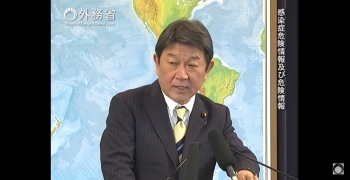Press Conferences
Press Conference by Foreign Minister MOTEGI Toshimitsu
Friday, March 19, 2021, 6:20 p.m. Ministry of Foreign Affairs
Japanese
Use of LINE for Work
Asahi Shimbun, Sato: Excuse me for asking questions on a matter other than diplomacy. There are reports about the issue of personal information on the free communication app LINE being accessible to an affiliated company in China. I would like to ask questions in relation to this. Do you use LINE for work? If so, how do you use it? Also, please tell us your reaction to this situation, and whether you will consider stopping or reviewing your use of the app if you use it.
Mr. MOTEGI Toshimitsu, Minister for Foreign Affairs: I do not use LINE for work. I believe that security is extremely important.
Meeting of the Top Diplomats of the United States and China
NHK, Yamamoto: I would like to ask about the meeting of the top diplomats of the United States and China. It is being reported that both sides exchanged criticisms from the beginning of the meeting. It seems that the meeting will continue. What points are you paying attention to?
Minister Motegi: Firstly, during my Foreign Ministers’ Meeting with Secretary of State Blinken this week in Tokyo, we coordinated our recognitions on China and agreed to closely cooperate on issues faced by the region and the international community.
This of course includes responding to China. During our meeting, Secretary of State Blinken stated that during the U.S.-China meeting in Alaska, he would clearly convey what needs to be said and would like to have a frank exchange of views. I only know about the beginning of the meeting, but I feel that the meeting is being held in that way. I believe that the views and concerns of Japan and the United States, as well as like-minded countries with which we share fundamental values, are being clearly conveyed.
Japan will continue to advance various forms of cooperation under our strong relationship of trust with our ally the United States. We will also deepen our cooperation with countries with which we share fundamental values.
On the other hand, we will urge China to fulfill its responsibilities as a major power.
Japan-U.S. Security Consultative Committee (Japan-U.S. “2+2”) (China’s Objection)
Sankei Shimbun, Ishinabe: I would like to ask about China. China has objected considerably to the Joint Statement that was the outcome of the recent “2+2” meeting. The Spokesperson of the Chinese Ministry of Foreign Affairs criticized it in a press conference using considerably harsh expressions, such as that Japan is the strategic vassal of the United States and that Japan broke faith and harmed relations with China. Please tell us your reaction to this statement by the Chinese side.
Minister Motegi: Frankly, I believe we had excellent discussions during the Japan-U.S. Foreign Ministers’ Meeting and the Japan-U.S. “2+2.” The Joint Statement of the Japan-U.S. “2+2” compiled the lengthy exchange of views and shared recognition regarding matters including the regional strategic environment between the foreign ministers and defense ministers of Japan and the United States as a document. Particularly regarding the situation of China, the Joint Statement clearly states that the United States and Japan acknowledged that China’s behavior, where inconsistent with the existing international order, presents various challenges to the Japan-U.S. Alliance and to the international community. It also includes affirmation that Article 5 of the Japan-U.S. Security Treaty applies to the Senkaku Islands.
China’s reaction is its own, but there are various pending issues with China including the situation of the East China Sea. There is absolutely no change to Japan’s basic policy of firmly asserting what should be asserted, resolving each pending issue one by one, and strongly requesting China to take specific actions.
The EU’s Sanctions Against China
Nikkei Shimbun, Kato: I would like to ask about China. The EU recently decided to impose sanctions on Chinese officials in relation to the Uyghur human rights issue. It is expected that the official decision will be made soon. What is your view of this move by the EU, and how will the Government of Japan respond going forward?
Minister Motegi: It is my understanding that the EU has still not made a final decision. Additionally, many reports are being issued that serious human rights violations are occurring in the Xinjiang Uyghur Autonomous Region, which is causing increasing concern in the international community. Japan is also deeply concerned about the human rights situation in the region. I believe it is important to continue to closely cooperate with the international community to urge China on this issue.
In-Person Diplomacy with China
TV Asahi, Sato: You stated earlier that you will say what needs to be said to China. What is your current view on the necessity of directly meeting face to face yourself with the top diplomat of China?
Minister Motegi: We have been conducting communication with China at various levels up until now. We will continue to convey Japan’s views at the appropriate levels in a timely manner.
U.S.-Republic of Korea (ROK) “2+2”
NHK, Yamamoto: The U.S.-ROK “2+2” was held yesterday. If we look at the Joint Statement, it does not name or criticize China like the Joint Statement from the Japan-U.S. “2+2.” Please tell us your assessment of the results of the Japan-ROK ministerial meeting, including about this point.
Minister Motegi: This is a matter of the Japan-ROK ministerial meeting, so I would like to refrain from commenting from my position about discussions by third-party countries. I believe you will interpret it yourselves. In any event, as affirmed in the Japan-U.S. “2+2,” we believe that trilateral cooperation among Japan, the United States, and the ROK is important for the security, peace, and prosperity of the Indo-Pacific region, including responding to North Korea. In that sense, I believe that Japan, the United States, and the ROK need to cooperate.

